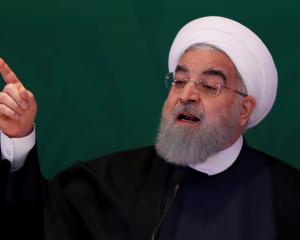Iran's foreign minister has expressed optimism that a visit by UN inspectors to Iran's nuclear facilities would produce an understanding, despite world concerns that Iran is trying to build nuclear weapons.
The three-day inspection tour by the International Atomic Energy Agency team comes during spiking tension. The West is imposing new sanctions to try to force Iran to slow or halt its nuclear programme, and Iran is threatening to close the Strait of Hormuz, a vital oil passage, in retaliation.
Visiting Ethiopia, Iranian Foreign Minister Ali Akbar Salehi appeared to be trying to defuse the crisis.
"We are very optimistic about the mission and the outcome" of the IAEA mission, Salehi was quoted as saying by Iran's semiofficial Mehr news agency.
"We've always tried to put transparency as a principle in our cooperation with IAEA," Salehi said. "During this visit, the delegation has questions and the necessary answers will be given,"
The findings from the visit could greatly influence the direction and urgency of US-led efforts to rein in Iran's ability to enrich uranium - which Washington and allies fear could eventually produce weapons-grade material. Iran has declined to abandon its enrichment labs, but claims it seeks to fuel reactors only for energy and medical research.
The team is likely to visit an underground enrichment site near the holy city of Qom, 130km south of Teheran, which is carved into a mountain as protection from possible airstrikes. Earlier this month, Iran said it had begun enrichment work at the site, which is far smaller than the country's main uranium labs but is reported to have more advanced equipment.
The U.N. nuclear agency delegation includes two senior weapons experts - Jacques Baute of France and Neville Whiting of South Africa - suggesting that Iran may be prepared to address some issues related to the allegations that it seeks nuclear warheads.
In unusually blunt comments ahead of his arrival, the IAEA's Deputy Director General Herman Nackaerts - who is in charge of the agency's Iran file - said he wants Teheran to "engage us on all concerns."
Iran has refused to discuss the alleged weapons experiments for three years, saying they are based on "fabricated documents" provided by a "few arrogant countries" - a phrase authorities in Iran often use to refer to the United States and its allies.
"So we're looking forward to the start of a dialogue," Nackaerts told reporters at Vienna airport. "A dialogue that is overdue since very long."
In a sign of the tensions that surround Iran's disputed nuclear programme, a dozen Iranian hard-liners carrying photos of slain nuclear expert Mostafa Ahmadi Roshan were waiting at Teheran's Imam Khomeini airport on Sunday.
Iranian state media allege that Roshan, a chemistry expert and director of the Natanz uranium enrichment facility in central Iran, was interviewed by IAEA inspectors before being killed earlier this month in a bomb attack that Iran claims is part of an Israeli-led covert campaign of sabotage and slayings. Roshan was at least the fourth member of Iran's scientific community to be assassinated.
In Vienna, the IAEA said it did not know Roshan and never talked to him.
The IAEA team wants to talk to key Iranian scientists suspected of working on a weapons programme. They also plan to inspect documents related to nuclear work and secure commitments from Iranian authorities to allow future visits.
It's unclear how much assistance Iran will provide, but even a decision to enter a discussion over the allegations would be a major departure from Iran's frequent simple refusal to talk about them.
Iran also has accused the IAEA in the past of security leaks that expose its scientists and their families to the threat of assassination by the US and Israel.
The visit was set to coincide with a vote in Iran's parliament on a bill that would require the government to immediately cut the flow of crude oil to Europe in retaliation for sanctions. Lawmakers postponed the vote Sunday to further study the bill, and no date for a vote has been set.
The draft bill is Iran's response to an EU decision last week to impose an embargo on Iranian oil. The measure is set to take full effect in July.
The head of Iran's state oil company said Sunday that pressures on Iran's oil exports - the second biggest in OPEC - could drive prices as high as $150 a barrel.
"It seems we will witness prices from $120 to $150 in the future," Ahmad Qalehbani was quoted by the official Islamic Republic News Agency. He did not give a timeframe for the prediction, nor any other details.
The price of benchmark US crude on Friday was around $99.56 per barrel. About 80 percent of Iran's foreign revenue comes from exporting around 2.2 million barrels of oil per day.
Oil prices have been driven higher in recent weeks by Iran's warnings that it could block the Strait of Hormuz at the mouth of the Gulf, the route for about one-fifth of the world's oil.
Last week, the American aircraft carrier USS Abraham Lincoln, joined by French and British warships, entered the Gulf in a show of strength against any attempts to disrupt oil tanker traffic.











